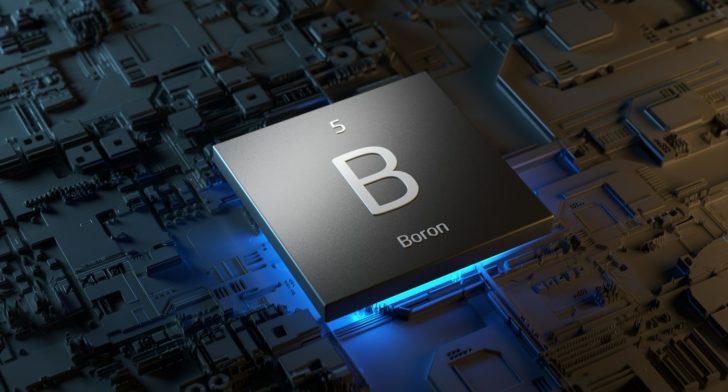Have you ever wondered, “What is boron?” and about the unique properties and potential health benefits of this lesser-known element? Get ready to discover a world of fascinating facts and insights into this versatile chemical element. This blog post will guide you through the basics of boron, from its elemental composition and chemical properties to its various applications, presence in the environment, and potential health benefits. So let’s dive into the intriguing world of boron!
Table of Contents
Key Takeaways
Boron is an element with a range of industrial applications and potential health benefits.
Boron displays various chemical properties, found in natural sources such as rasorite and plant-based foods, extracted through distillation or reduction processes.
Supplementation should be taken under the guidance of a healthcare professional for optimal health benefits. Dietary boron intake can also provide necessary requirements.
The Basics of Boron

Boron is a chemical element with an atomic number of 5. Existing in different forms, such as amorphous boron and pure crystalline boron, elemental boron plays a vital role in numerous industrial applications and has potential health benefits.
Boron is commonly found in compounds like boric acid, borates, and borosilicates, providing indispensable support for plant growth and various industrial processes involving boron atoms.
Elemental Composition
As a metalloid element, boron belongs to Group 13 of the periodic table and can be found in various forms, including crystalline boron. Its isolation is predominantly achieved through the distillation of boron as the volatile trimethyl borate, a process that separates the boron atom from other elements in the compound.
Boron can be produced through the reduction of B2O3 with magnesium metal or the reduction of boron trichloride by hydrogen on a heated tungsten filament.
Chemical Properties
Boron exhibits a range of chemical properties, with the ability to form stable covalent bonds and act as a Lewis acid. Covalent bonds are formed by boron when it shares electrons with other atoms, while it acts as a Lewis acid by accepting electrons from other atoms. One example of such compounds is boron hydrides.
The diverse chemical characteristics of boron make it a valuable element in various industrial applications and potential health benefits.
Occurrence and Extraction
Boron is primarily found in boron mines located in arid regions of Turkey and the USA, as well as in Argentina, Chile, Russia, China, and Peru. Boron is obtained through a variety of techniques such as open-pit mining, underground mining, and solution mining.
We will now examine the various natural sources of boron and the extraction methods utilized.
Natural Sources
Rasorite, or kernite, is the primary source of boron. It is a mineral which can be found in nature and is used in the production of boron oxide.
In addition to minerals, plant-based foods and beverages, as well as boron-rich soils, are considered natural sources of boron. Boron is present in trace amounts in plant-based foods and beverages, while its concentration in boron-rich soils is notably higher than in other soils.
Extraction Methods
The primary extraction methods for boron include vapor phase reduction and the heating of boron trioxide with magnesium powder. The choice of extraction method depends on the source of boron and the desired outcome.
Hot water extraction, solvent extraction, and refinement of boron ore are some of the techniques employed. Grasping these extraction methods aids in maximizing boron’s utilization in numerous applications.
Industrial Applications of Boron
Boron’s unique properties make it indispensable in numerous industrial applications. From metallurgy to electronics and energy production, boron plays a crucial role in enhancing the performance and efficiency of various processes and materials.
We will now dissect the specific industrial uses of boron.
Metallurgy
In the field of metallurgy, boron is used to improve the properties of steel and other nonferrous metals. As a grain refiner and hardening agent for aluminum, boron can be incorporated into steel and non-ferrous metals to enhance their properties. Additionally, boron compounds are employed in the fabrication of alloys, rare earth magnets, amorphous metals, welding fluxes, and plating.
The advantages of employing boron in metallurgy are many. Boron has been shown to enhance the strength, hardness, and wear resistance of steel and other nonferrous metals. Moreover, it can be used to decrease the amount of carbon in steel, thereby improving its weldability and ductility. These properties make boron a valuable addition to the metallurgical industry.
Electronics
In the realm of electronics, boron plays a significant role in doping semiconductors and generating graphene quantum dots with regulated optical properties. Boron is widely employed as a solvent in the fabrication of semiconductors, serving as a key ingredient for the development of economical silicon components in electronics.
Furthermore, boron nitride, renowned for its high thermal conductivity and remarkable dielectric characteristics, is often utilized as an additive or component in electronic systems.
Energy Production
Boron’s involvement in energy production is multifaceted. It is used in boron neutron capture therapy, a type of radiation therapy for treating certain types of cancer. This therapy involves injecting a solution containing boron-10 into the body, which is then targeted by a beam of neutrons. The boron-10 absorbs the neutrons, releasing energy that destroys cancer cells.
Aside from its medical applications, boron also serves as a carrier for nuclear fuels, such as uranium and plutonium, to control the rate of fission reactions and regulate the amount of energy produced. This versatility makes boron a valuable component in the field of energy production.
Boron in the Environment
Boron is naturally present in the environment. It is released from sources such as oceans, volcanic activities, and geothermal steam. It can also be found in waste minerals and wastewater from mining operations. The concentration of boron in the marine environment is notably higher than in terrestrial environments.
We will now examine boron concentrations in the atmosphere and how it interacts with soil and water.
Atmospheric Presence
Boron oxides are eliminated from the atmosphere via precipitation and deposition. Migrating to the water column, boron can enter our environment in multiple ways. Atmospheric deposition, precipitation, or weathering of boron-containing rocks are all sources.
The presence of boron in the atmosphere is attributed to a range of sources, including:
Emissions from the burning of biomass and coal
Natural deposits of borates
Anthropogenic sources such as wastewater irrigation and fertilizer application.
Soil and Water Interaction
Boron’s environmental fate is influenced by its adsorption to soils and sediments, which affects its availability to plants and animals. Excess boron can be naturally present in the soil or accumulate through irrigation with boron-rich water.
Its availability to plants is contingent upon the amount of boron present in the soil and the pH of the soil. It’s vital to comprehend how boron interacts with soil and water for effective management of its environmental and health impacts.
Health Benefits and Risks of Boron
Boron may offer health benefits, such as improved bone health and cognitive function, and reduced cancer risk. However, excessive intake can pose risks, and certain precautions should be taken.
We will now delve into the potential health benefits and risks associated with boron.
Bone Health
Boron may support bone growth and maintenance by aiding in the absorption of calcium and magnesium. It is believed that boron may play a role in bone growth and formation, potentially through its impact on osteoblast and/or osteoclast activity or its influence on serum steroid hormone levels and calcium metabolism. However, further research is necessary to ascertain the effects of boron supplementation on bone health in humans.
Boron deficiency can cause serious physical harm, including:
Abnormal limb development
Delayed maturation of growth plates
Decrease in bone strength
Decrease in bone volume fraction
Decrease in trabecular thickness
On the other hand, supplementation with boron has been shown to enhance certain indicators of bone strength. These findings highlight the potential importance of boron for maintaining optimal bone health.
Cognitive Function
Some evidence suggests that boron may play a role in cognitive function and brain health. Research has demonstrated that boron deprivation can lead to a decline in motor speed, dexterity, and cognitive function.
Furthermore, boron supplementation may improve cognitive function and memory. Nevertheless, further research is necessary to fully comprehend the consequences of boron on cognitive function.
Cancer Risk Reduction
Observational studies suggest that regular consumption of boron might reduce the risk of various forms of cancer. These include prostate cancer, as well as lung and cervical cancer in women.
However, further research is required to confirm these findings and gain a comprehensive understanding of the mechanisms and effectiveness of boron in cancer risk reduction. The potential of boron to reduce cancer risk highlights the importance of understanding its role in human health.
For more info, visit BORON – Uses, Side Effects, and More.
Boron Supplementation
Boron supplementation comes in many varieties, such as:
Sodium borate
Sodium tetraborate
Boron amino acid chelate
Boron ascorbate
Boron aspartate
Boron citrate
Boron gluconate
Boron glycinate
Calcium fructoborate
However, precautions and dosage recommendations should be followed when taking boron supplements to avoid potential side effects and interactions.
We will now look into the different forms of boron supplements and the necessary safety measures.
Forms of Supplements
Boron supplements come in different forms, such as capsules, tablets, and powders, and should be third-party tested for quality and safety. Some of the forms of boron supplements available include boron aspartate, boron citrate, boron gluconate, boron glycinate, and calcium fructoborate.
These supplements can help individuals meet their boron intake requirements and potentially improve their overall health.
Precautions and Dosage Recommendations
When taking boron supplements, it is important to follow dosage recommendations and consult a healthcare professional, such as a registered dietitian, pharmacist, medical doctor, or other healthcare professional, to avoid potential side effects and interactions.
In the event of a boron overdose, it is advised to seek medical assistance or contact the poison control center. Guaranteeing the safety and efficiency of boron supplements is key for optimal health and to fully benefit from this multifaceted element.
Dietary Sources of Boron
Dietary boron can be found in various plant-based foods, such as fruits, vegetables, nuts, and legumes, as well as beverages like wine and beer. The primary dietary sources of boron in the United States are coffee, milk, apples, dried and cooked beans, and potatoes.
By incorporating these foods and beverages into a balanced diet, individuals can meet their dietary boron intake requirements and potentially improve their overall health.
Summary
In conclusion, boron is a fascinating and versatile element with a wide range of applications and potential health benefits. From its unique chemical properties and industrial uses to its presence in the environment and its potential role in bone health, cognitive function, and cancer risk reduction, boron continues to be an intriguing subject for further research and exploration.
As our understanding of boron’s properties and potential benefits expands, it becomes increasingly clear that this lesser-known element holds great promise for improving our lives and well-being. By incorporating boron-rich foods into our diets and following appropriate guidelines for supplementation, we can harness the power of boron to support our health and enhance our understanding of this remarkable element.
Frequently Asked Questions
What does boron do for your body?
Boron is important for bone growth and formation, as it can affect osteoblast and osteoclast activity or influence serum steroid hormone levels and calcium metabolism.
It also has antioxidant effects, and is commonly used to treat boron deficiency, yeast infections, and improve athletic performance, wound healing, and vitamin D absorption.
How much boron is toxic to humans?
Exposure to large amounts of boron (about 30 g of boric acid) can be toxic to humans and lead to death over short periods of time.
Extremely high doses of boron (15,000 to 20,000 mg) can also cause death in adults.
How much boron should you take a day?
It is recommended that adults take 1-13 milligrams of boron per day, with the most common daily usage being 3-6 milligrams.
For children, 1-3 milligrams per day is the safe intake based on age.
What is boron found in?
Boron is a dark silver metalloid found in many plant-based foods, such as fruits, beans, and leafy green vegetables. It is also found in grains, prunes, raisins, noncitrus fruits, nuts, coffee, milk, potatoes, and borax and colemanite minerals.
Most of the boron consumed comes from coffee, milk, apples, dried and cooked beans, and potatoes.
Is boron a metal?
Boron is neither a metal nor a non-metal, but a metalloid which has properties of both metal and non-metal. It lacks a valence electron and does not form a covalent bond with other elements, but at high temperatures, it conducts electricity.
At room temperature, it is an insulator.









